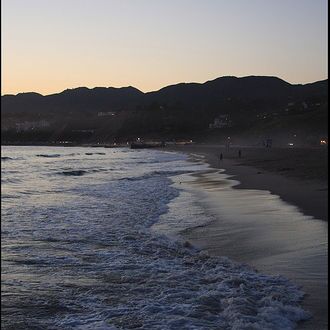Party All Night on The Beach, Says Coastal Commission

L.A. imposes a midnight-5 a.m. curfew on its beaches, but the state Coastal Commission has told the city they can't do that.
Details from the L.A. Times on the potential post-midnight beach frolics and the reasons why:
Beach curfews became widespread across California as crime surged in the early 1990s and beach communities -- Long Beach, Huntington Beach and Coronado among them -- enacted or expanded nighttime closures out of concern for public safety.In 1993 the Coastal Commission advised dozens of cities and counties that such closures were illegal without state permits, and local officials lashed back, defending their right to local control. Then-Gov. Pete Wilson accused the coastal panel of overstepping its bounds, and state lawmakers vowed legislation that would curb its authority, though nothing came of those pledges. Now that crime rates have fallen and a growing population has intensified use of the state's 1,100-mile shoreline, commission officials said they would be asking communities up and down the coast to either roll back their curfews or justify their restrictions on access.
L.A. is going to fight for its right to not let us party on the beach in the wee small hours of the night:
The Los Angeles city attorney's office contends that the Coastal Commission has no authority over local laws beyond approving buildings, fences and other physical structures and accuses the panel of starting the inquiry into the city's curfews as payback for L.A. taking the commission to court after it rejected the parking restrictions....Legal experts said Los Angeles would have little chance of convincing a judge that the commission had overreached. The courts have repeatedly sided with the commission when it has exerted its authority over local governments, and the 1976 Coastal Act gives the panel broad authority over both development along the coast and any change in the intensity of land use or access to the ocean.
The Coastal Commission is a notoriously heavy-handed civic body. I wrote for Reason magazine last August about its attempts to force a hostile documentarian into handing over his footage to them.
In other coastal news this week, the passage of Proposition 26 makes it harder for the Coastal Commission to levy certain fees. Details from Capitol Weekly:
The Commission, which has jurisdiction over California's 900-mile-long coastal zone as well as oil platforms in state waters, levies regulatory charges known as "in-lieu fees" on developers, petroleum companies, homeowners, businesses and the like. The fees cover the costs of resolving any impacts on coastal property. In the case of the platforms, the fees are set according to age of the platform, water depth, whether it was decommissioned before its scheduled expiration date and other factors.....The provision [of Prop 26] requiring a two-thirds vote means that at least eight of the Coastal Commission's members would be required to approve a fee, whether for rigs to reefs, developers or anything else. Currently, seven votes are required.
Image taken by Flickr user 3D83RT. Used under user Creative Commons license.


